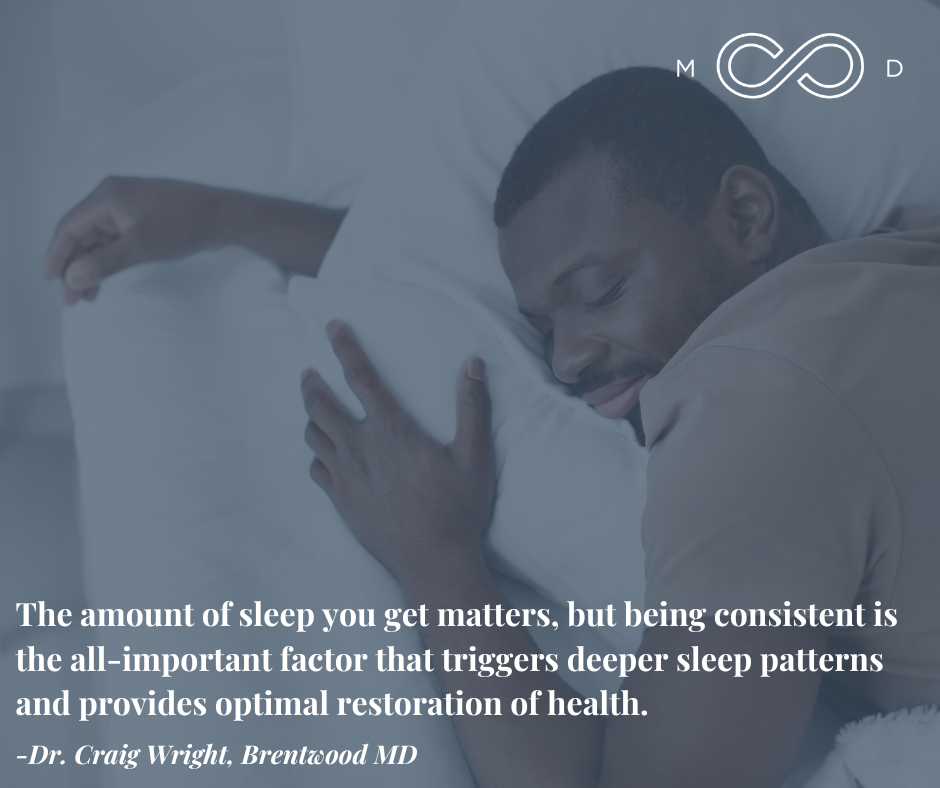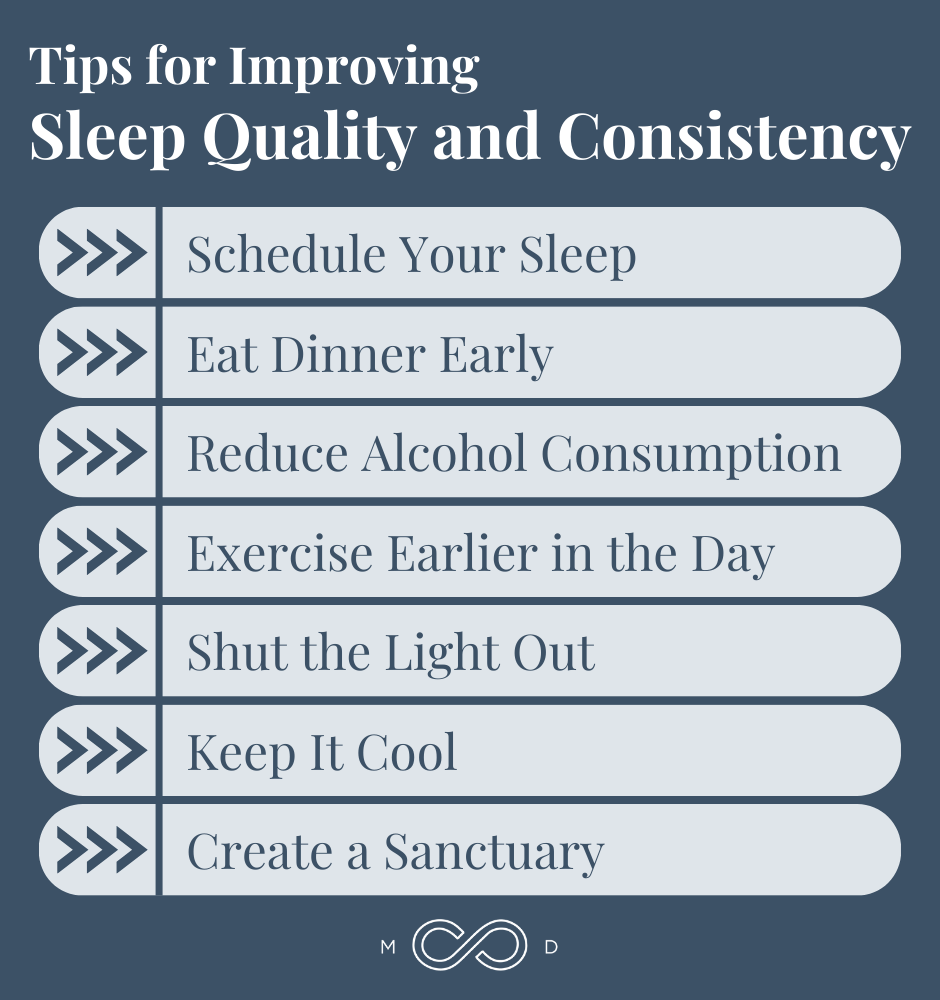Do you ever think of all the things you could accomplish if you didn’t have to sleep so much?
It may seem unfortunate, but we humans were created to spend roughly a third of our lives asleep. However, cutting back on the number of hours you spend snoozing can have ripple effects. So many aspects of your health — immune function, heart health, hormone balances, neurologic functions like memory and learning, etc. — can only flourish when you provide your mind and body with enough rest.
But how much sleep is a solid foundation for health? One of the questions I’m asked most often is, “Is six hours of sleep enough?”
The short answer is no — research shows that most adults need between seven and nine hours of sleep for optimal health. However, this is the wrong question to ask in the first place.
Not all sleep is equal. You’re probably better off getting fewer hours of restful, rejuvenating sleep than tossing and turning all night. Start asking yourself a different question: what quality of sleep am I getting?
Why Are We So Hung Up on How Long We Sleep?
It’s human nature to try to control the variables we can — and sometimes the ones we can’t.
When it comes to sleep, the variable most securely within our grasp is the number of hours we spend in bed. However, just because it’s the simplest factor to control doesn’t mean it’s the most effective way to improve our sleep metrics. In fact, focusing too much on sleep quantity may lead us to undervalue sleep quality.
This is why you may feel like your health doesn’t respond to your sleep as you’d expect. You may notice your energy levels, immune health, and ability to focus leave much to be desired and think, “But I’ve been getting good rest. I slept for eight hours last night!”
This is why it’s crucial to consider some of the barriers to sleep you may be experiencing. Are you getting deep enough sleep that your body can recharge itself? Do your hormones get to replenish and your energy levels fully recover? If you can’t get high-quality rest, you won’t reap the rewards a good night’s sleep can provide, regardless of how many sleep hours your smartwatch reports.
The Importance of Consistency for Sleep Quality
If your goal is to improve your sleep quality, consistency is key. When you maintain consistent sleep behaviors, your body settles into a healthy rhythm, spending more time in the deepest sleep stages and activating health-building processes.
As your sleep deepens, your breathing rate slows and your blood pressure falls, allowing your cardiovascular system to rest and recover. Your immune system heals from the day’s events, minimizes inflammation, and replenishes immune cells. Your body creates new hormones like testosterone. Your mind consolidates and encodes new memories. Your brain rebalances levels of neurotransmitters, helping you wake up in a better mood.
In other words, spending the appropriate amount of time in each sleep stage leaves you feeling invigorated.
You’ll notice when you’re not reaching the deeper sleep stages. You may feel less energized, more anxious, and more depressed. During your waking hours, your blood pressure and heart rate may be higher than you’d like. Your immune system may not work as well as it should, leading to illness.
The amount of sleep you get matters, but being consistent is the all-important factor that triggers deeper sleep patterns and provides optimal restoration of health.
Tips for Improving Sleep Quality and Consistency
So, how do you become more consistent?
Approach habitual changes like you would approach athletic training. You have to put in the work and practice those new behaviors every day. This helps your body adjust and respond to the various hormones and neurotransmitters that control your sleep-wake cycles.
For example, establishing habits to help your body wind down at night helps improve sleep quality and reduce the time it takes to fall asleep.
Over time, you can train your body and brain to fall into healthy sleep rhythms and experience high-quality sleep on a regular basis.
1. Schedule Your Sleep
Going to bed and waking up around the same time each day is essential if you want to improve your sleep quality and your health. While deciding on a timetable, make sure you’ll also be getting the proper quantity of shut-eye. And no, six hours isn’t enough sleep for good health. Aim for at least seven, ideally more.
Take a look at your schedule. What’s a reasonable, reproducible window of sleep that will yield seven to nine hours of rest per night?
For example, if you need to be at work early, going to bed at 10 p.m. and waking up at 6 a.m. gives you a solid eight hours. More of a night owl? Hit the hay at midnight and set your alarm for 8. Always try to go to bed and wake up within 30 minutes of your designated window.
And yes, that includes the weekends. When you alter your sleep habits for just two days, you need another couple of days for the body processes that regulate sleep to adjust back to your sleep schedule. This leaves you more sluggish during the early part of the work week and makes it difficult to maintain the enhanced sleep quality you’re after.
2. Eat Dinner Early
Try to eat dinner at least three to four hours before you go to bed — and don’t make it your biggest meal of the day. The digestion process can interfere with sleep.
3. Reduce Alcohol Consumption
Perhaps counterintuitively, drinking alcohol interferes with sleep quality. Alcohol complicates your breathing patterns, sometimes even leading to apnea episodes, and causes you to wake up more often throughout the night.
4. Exercise Earlier in the Day
Getting more physical activity during the day can help you sleep better at night. However, strenuous activity raises your heart rate, sending your body signals to stay awake. Try to make sure you conclude your exercise at least three hours before bedtime.
5. Shut the Light Out
Darken your bedroom by putting up blinds and/or curtains and removing any electronics or other sources of light. Additionally, keep your room as quiet as possible, or wear foam earplugs to bed. These tactics help you avoid disturbances that interrupt your sleep rhythms.
6. Keep It Cool
Because your body temperature naturally drops during sleep, it can also help to keep your bedroom cool. I recommend dropping the temperature to 65–67º. It may seem counterintuitive, but going to bed in a cold environment can help your body ease into a state of sleep.
7. Create a Sanctuary
As much as you can, try to reserve your bedroom space for only two activities: sleep and intimacy. Our brains associate environments with experiences. Train your brain to associate your bedroom with sleep and not with activities like working, watching TV, or folding laundry.
Is 6 Hours of Sleep Enough? Final Thoughts
So, is six hours of sleep enough? Sorry, but it isn’t.
The quality of your sleep may matter more than the quantity, but six hours is rarely adequate to let your body recharge, renew, and tackle the challenges you face every day. If you aren’t getting enough sleep, you’re likely seeing issues in your immune function, memory, focus, and energy levels.
If you’ve been struggling physically or mentally, try changing up your sleep schedule according to my tips above. When you maintain a higher level of consistent sleep quality, you may be surprised just how much your health — and your mood — improves.

Dr. Wright joined Brentwood MD in 2022 as the model allows him to spend more time connecting with patients and build a foundation of exceptional care. He is a Nashville native and completed his family medicine residency at the University of Tennessee Health Science Center, where he also served as Chief Resident. He believes that your health deserves a prominent position on your priority list, and would be honored to serve you and your family.








